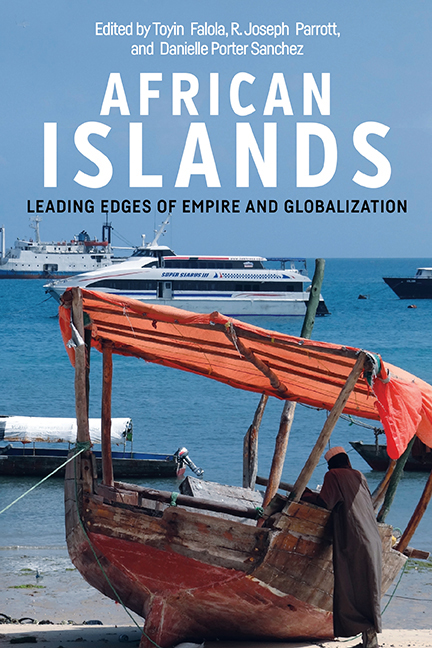Book contents
- Frontmatter
- Dedication
- Contents
- Introduction: Arbiters and Witnesses of Change: Contextualizing Conversations on African Islands
- Part 1 Atlantic Ocean Islands
- 1 The Canaries to Africa: The Atlantic Strategy of “To Be or Not to Be”
- 2 Sugar, Cocoa, and Oil: Economic Success and Failure in São Tomé and Príncipe from the Sixteenth to the Twenty-First Centuries
- 3 The Bijagos of Canhabac Island (Guinea-Bissau)
- 4 An Island in the Middle of Everywhere: Bioko under Colonial Domination
- 5 Cursing in Bioko and Annobón: Repeating Islands that Don't Repeat
- 6 African Ports and Islands during the Second World War
- 7 “Nos lingua, nos kultura, nos identidadi”: Postcolonial Language Planning and Promotion in Cabo Verde and the Cape Verdean Diaspora
- Part 2 Indian Ocean Islands
- Notes on Contributors
- Index
2 - Sugar, Cocoa, and Oil: Economic Success and Failure in São Tomé and Príncipe from the Sixteenth to the Twenty-First Centuries
from Part 1 - Atlantic Ocean Islands
Published online by Cambridge University Press: 31 August 2019
- Frontmatter
- Dedication
- Contents
- Introduction: Arbiters and Witnesses of Change: Contextualizing Conversations on African Islands
- Part 1 Atlantic Ocean Islands
- 1 The Canaries to Africa: The Atlantic Strategy of “To Be or Not to Be”
- 2 Sugar, Cocoa, and Oil: Economic Success and Failure in São Tomé and Príncipe from the Sixteenth to the Twenty-First Centuries
- 3 The Bijagos of Canhabac Island (Guinea-Bissau)
- 4 An Island in the Middle of Everywhere: Bioko under Colonial Domination
- 5 Cursing in Bioko and Annobón: Repeating Islands that Don't Repeat
- 6 African Ports and Islands during the Second World War
- 7 “Nos lingua, nos kultura, nos identidadi”: Postcolonial Language Planning and Promotion in Cabo Verde and the Cape Verdean Diaspora
- Part 2 Indian Ocean Islands
- Notes on Contributors
- Index
Summary
Boom, Decline, and Frustrated Hopes
São Tomé and Príncipe played a pioneering role in the economic history of sugar and cocoa in the sixteenth and nineteenth centuries, respectively, while in the late twentieth century the small country was a latecomer in the development of oil. In the sixteenth century the Portuguese established on the hitherto uninhabited islands the first plantation economy in the tropics, based on sugar monoculture and slave labor. The sugar industry boomed for almost a century. However, at the end of the sixteenth century sugar production began gradually to decrease due to a variety of factors, predominantly the emergence of Brazilian sugar, forcing the island to adapt to changing global exchange patterns. In the course of the seventeenth century, the plantation economy virtually disappeared, reducing the island to subsistence agriculture and the provisioning of slave ships. The introduction of coffee in 1787 and cocoa from Brazil around 1820 enabled the reestablishment of the plantation economy in the nineteenth century. At the end of this century cocoa production surpassed that of coffee and became by far the most important export crop. In the early twentieth century the archipelago was even for a couple of years the world's largest cocoa producer, although after the First World War, cocoa production began progressively to decrease due to various socioeconomic and ecological factors, including pest infestation of crops and the competition of smallholders in the neighboring continent.
After independence from Portugal in 1975 the downfall of cocoa accelerated due to mismanagement by the ruling regime. Finally, in the 1990s the plantation economy ceased to exist when plantation lands were divided and distributed to small farmers. Despite a currently low output, cocoa remains the principal export product since several attempts of economic diversification have failed. The country's oil hopes began in 1997 when the government signed the first oil exploration agreement with foreign investors, but initial optimism has been replaced by increasing doubts as various offshore exploration drillings have failed to discover commercially viable oil. The chapter analyzes the successes and failures of the country's economy since the archipelago's settlement in the late fifteenth century and puts them in a wider historical and sociopolitical context.
- Type
- Chapter
- Information
- African IslandsLeading Edges of Empire and Globalization, pp. 68 - 95Publisher: Boydell & BrewerPrint publication year: 2019

